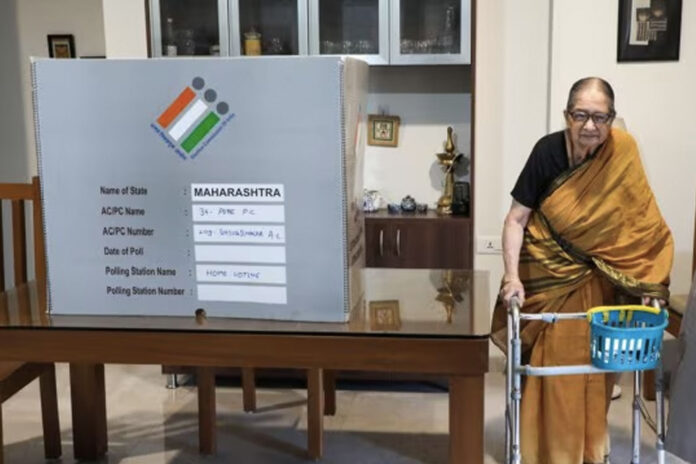In a pathbreaking initiative, the Election Commission of India (ECI), for the first time in a General Election, has provided the facility of home voting for the elderly and Persons with Disabilities in the 2024 Lok Sabha elections.
Voters above 85 years of age and Persons with Disabilities (PwDs) with 40% benchmark disability, can avail the optional home voting facility. There are over 81 lakh 85+ aged voters and 90 lakh + PwD voters registered across the country.
Voters in this category have already began casting their votes for phase I, II and III of polling. This initiative marks a significant stride towards ensuring inclusivity and accessibility of the electoral process and in bolstering democratic participation.
Chief Election Commissioner Shri Rajiv Kumar along with Election Commissioners Shri Gyanesh Kumar and Dr Sukhbir Singh Sandhu had announced that by giving home voting facility to elders and PwDs, it is the Commission’s expression of care and respect towards them and hoped that it would set an example for society to adopt it in day-to-day life.
Voters who availed the home voting facility in phase 1, II and III of the polls have expressed gratitude and satisfaction for the ECI initiative.
Voting from home takes place with involvement of a full contingent of polling staff and security personnel with secrecy of voting diligently maintained. With this, ECI has taken another decisive step towards facilitating a more equitable and representative democracy, where every citizen’s voice matters, regardless of physical limitations or age.
How to avail the Vote from Home Facility
The procedure to avail this facility is quite simple. Eligible voters must complete Form 12D and submit it to the returning officer. PwD voters submit a baseline disability certificate with their applications.
Form 12D, is a letter informing the Assistant Returning Officer (ARO) that the person may not be in a position to go to the polling station to vote. The form can be downloaded online from the ECI website or collected from the office of the representative district officer of a parliamentary constituency.
The form has to be filled and submitted within five days of notification of the polling date.
The Booth Level Officer (BLO) is responsible for retrieving Form 12D from the elector’s place of residence when the required documentation has been completed. Candidates receive a list of these electors in order to maintain accountability and transparency; if they wish, they can choose a representative to supervise the process.
Following this, a dedicated team of polling officials along with security officials visits the voter’s residence to collect their votes. Crucially, voters are notified ahead of time of the planned visit, allowing them to be prepared to exercise their right to vote in a safe and comfortable manner.
During the visit, the polling team is expected to follow protocol under the Conduct of Elections Rules, 1961. Each team of poll officers is required to (a) issue postal ballot to each of the Absentee Voters assigned to it, (b) brief the elector about the procedure to be followed for voting through postal ballot, (c) make sure that the elector votes without anyone influencing his/her choice, and ensuring the secrecy of voting. People with blindness or physical infirmity are allowed to nominate a companion and take their assistance while home voting. The person can act as a companion of only one elector, and is required to give a declaration in a form prescribed by the ECI, and “keep the vote secret.”
To further expedite the procedure and improve accessibility, voters can also receive notifications via SMS about the days when their home voting facility will be active. The complete process is videographed for transparency.
In the 2024 Lok Sabha elections, the Election Commision has left no stone unturned to uphold its motto of ensuring – No voter is left behind.









